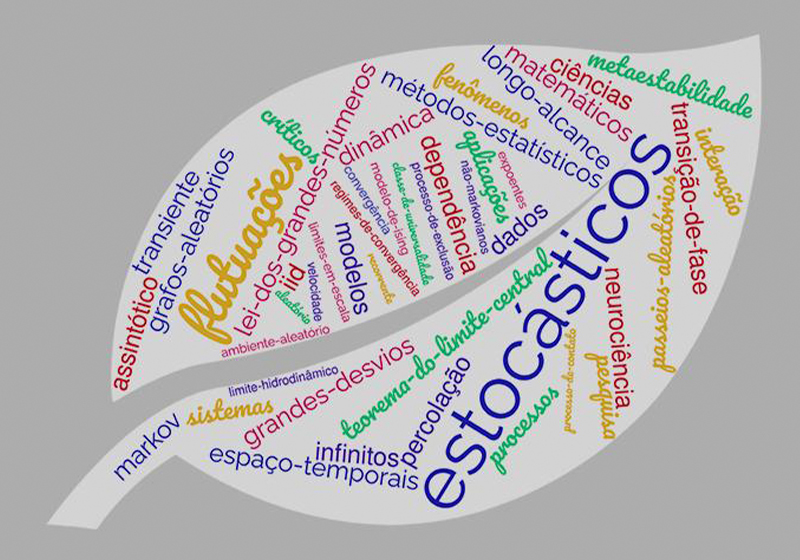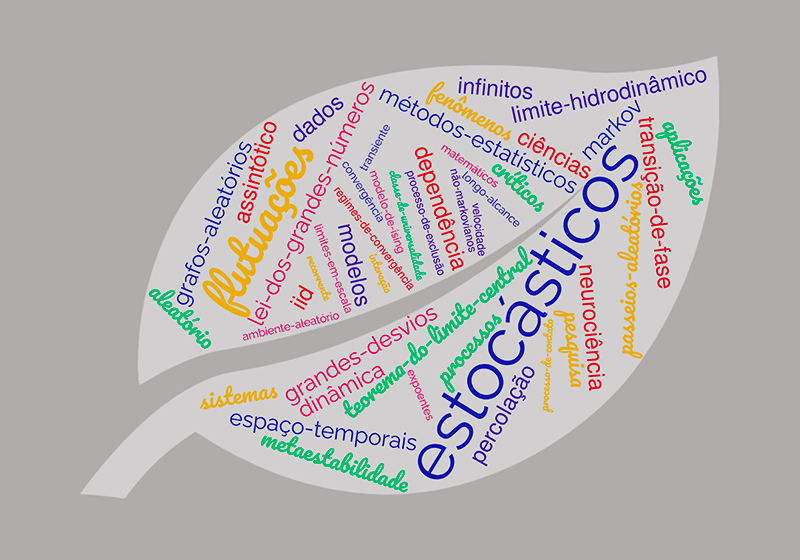 Title: Slow phase for the ARW on the unidimensional ring
Title: Slow phase for the ARW on the unidimensional ring
Our next seminar will be held on Monday, December 2, from 3:30 p.m. to 4:30 p.m. (Rio de Janeiro local time).
This meeting will take place at room C116 - Bloco C - CT – Instituto de Matemática – UFRJ. There will be no transmission online.
Speaker: Célio Augusto Terra de Souza (UFMG and UFRJ)
Abstract: We study Activated Random Walks on a unidimensional ring \mathbb{Z}/N \mathbb{Z}. In this conservative model, a number \zeta* N of particles is distributed on the unidimensional ring. Those particles are either active or sleeping. Active particles perform independent continuous-time random walks at rate 1 and fall asleep at rate \lambda. Sleeping particles do not move. If \zeta<1, this system will eventually be attracted to some configuration with only sleeping particles. We will prove that, for every sleeping rate \lambda, activity will be sustained for a long time (exponential in the size of the block) if the density \zeta is close enough to 1.
More complete information about the seminars can be found at
https://ppge.im.ufrj.br/seminarios-de-probabilidade/
Sincerely,
Organizers: Giulio Iacobelli and Maria Eulalia Vares

Dear colleagues,
Our next seminar will be held on Monday, November 18, from 3:30 p.m. to 4:30 p.m. (Rio de Janeiro local time). This meeting will take place on Google Meet, through the link below:
https://meet.google.com/snf-jawc-gfa
Speaker: Gioia Carinci (UNIMORE, Italy)
Title: Integrable models of non-equilibrium
Abstract: The characterization of the invariant measures for non-reversible particle systems driven out-of-equilibrium via the action of external reservoirs is typically a difficult task. This has been achieved e.g. for the well-known exclusion process. In this talk I will show a class of boundary driven zero-range models whose non-equilibrium steady state can be explicitly characterized via a probabilistic mixture of inhomogeneous product measures. This characterization of the non-equilibrium steady state allows to compute the formula for the density large deviation function predicted by Macroscopic Fluctuation Theory and to establish the additivity principle.
This is from joint works with: Chiara Franceschini, Rouven Frassek, Davide Gabrielli, Cristian Giardinà, Frank Redig and Dimitrios Tsagkarogiannis
All the talks are held in English.
More complete information about the seminars can be found at
https://ppge.im.ufrj.br/seminarios-de-probabilidade/
Sincerely,
Organizers: Giulio Iacobelli and Maria Eulalia Vares
 Title: A few scaling limits results for the facilitated exclusion process
Title: A few scaling limits results for the facilitated exclusion process
Our next seminar will be held on Monday, October 7, from 3:30 p.m. to 4:30 p.m. (Rio de Janeiro local time).
This meeting will take place on Google Meet: https://meet.google.com/eom-
Speaker: Marielle Simon (Université Lyon 1)
Abstract: I will present some recent results which have been obtained for the facilitated exclusion process, in one dimension. This stochastic lattice gas is subject to strong kinetic constraints which create a continuous phase transition to an absorbing state at a critical value of the particle density. If the microscopic dynamics is symmetric, its macroscopic behavior, under periodic boundary conditions and diffusive time scaling, is ruled by a non-linear PDE belonging to free boundary problems (or Stefan problems). One of the ingredients is to show that the system typically reaches an ergodic component in subdiffusive time. When the particle system is put in contact with reservoirs of particles (which can either destroy or inject particles at both boundaries), we observe an usual impact on the boundary values of the empirical density.
Based on joint works with O. Blondel, H. Da Cunha, C. Erignoux, M. Sasada and L. Zhao.
All the talks are held in English.
More complete information about the seminars can be found at
https://www.dme.ufrj.br/?page_id=3583
Sincerely,
Organizers: Giulio Iacobelli and Maria Eulalia Vares
 Title: Coalescing random walks and the Kingman coalescent model
Title: Coalescing random walks and the Kingman coalescent model
Speaker: Johel Victorino Beltrán Ramírez (FGV EMAp e PUCP)
Our next seminar will be held on Monday, October 21, from 3:30 p.m. to 4:30 p.m. (Rio de Janeiro local time). This meeting will take place at room C116 - Bloco C - CT – Instituto de Matemática – UFRJ. There will be no transmission online.
Abstract: Given a finite transitive graph and n particles labeled with numbers {1,2,3,...,n}, we place these particles on the set of vertices at random. Then, we let the particles evolve as a system of coalescing random walks: each particle performs a continuous-time simple random walk (SRW) and whenever two particles meet, they merge into one particle which continues to perform a SRW. At each time t, consider the partition P_t of {1,2,3,...,n} induced by the equivalence relation: i~j when particles i and j occupy the same vertex at time t. We show that the Kingman n-coalescent model emerges as a scaling limit for (P_t), as n is fixed and the size of the graph goes to infinity. This result allows me to talk about our main tool in our approach: the martingale problem.
Joint work with Enrique Chavez.
More complete information about the seminars can be found at
https://www.dme.ufrj.br/?page_id=3583
Sincerely,
Organizers: Giulio Iacobelli and Maria Eulalia Vares
More complete information about the seminars can be found at
https://www.dme.ufrj.br/?page_id=3583
Sincerely,
Organizers: Giulio Iacobelli and Maria Eulalia Vares

Title: Quantitative Hydrodynamics for a Generalized Contact Process
Speaker: Milton Jara (IMPA)
Our next seminar will be held on Monday, September 23, from 3:30 p.m. to 4:30 p.m. (Rio de Janeiro local time). This meeting will take place at room C116 - Bloco C - CT – Instituto de Matemática – UFRJ. There will be no transmission online.
Abstract: We use the framework of Quantitative Hydrodynamics to derive a CLT around its hydrodynamic limit for an interacting particle system inspired by integrate-and-fire neuron models. The hydrodynamic limit of this model was originally derived by Chariker, De Masi, Lebowitz and Presutti, and as an important intermediate step we show that this convergence holds at optimal L^2-speed.
Joint with Julian Amorim and Yangrui Xiang.
More complete information about the seminars can be found at
https://www.dme.ufrj.br/?page_id=3583
Sincerely,
Organizers: Giulio Iacobelli and Maria Eulalia Vares
